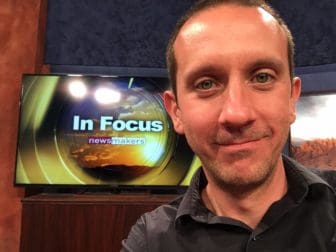
Heath Haussamen / NMPolitics.net
Barrel cactus in the desert east of Las Cruces.
COMMENTARY: I’ve spent lots of time in the desert east of Las Cruces lately, hunting, hiking and exploring. I’ve discovered pristine landscapes surprisingly close to our state’s second-largest city that are rarely touched by people. I found a massive covey of quail. I’ve seen gigantic barrel cactus that are decades old.
But in other spots, I’ve come across trash pits. Some people shoot up old televisions, furniture, bottles or other things and leave them. Others dump their household garbage.
I recently found a pair of high heels decaying in the sun.

Heath Haussamen
That was on my mind as I read about people trashing our national parks while the federal government was partially shut down. In California, people tore down protected Joshua trees. Some folks took off-road vehicles into restricted areas, damaging fragile ecosystems.
That attitude — do whatever you want while no one’s watching — is apparently very American.
I’d like to think we weren’t always this way — that, for example, the so-called Greatest Generation’s sense of duty and honor, which we are taught in school led them to save the world from the Nazis, points to a sense of community, morality and responsibility that once characterized America. The longer I live, and the more I learn about our history — our genocide of people from many Native American cultures, for example — the less I’m able to believe this.
Regardless, who we are as a society today is clear. We provide the bombs Saudis use to kill Yemenis because we don’t give a damn if Arab children die as long as our corporations are profiting. Only when the world sees an image of a starving child near death, and journalists connect our bombs to the horror, do we act — and then we’re just seeking to protect our fictitious reputation as a shining city on a hill.
We help the Kurds in Syria fight the Islamic State until we’re bored. Then we abandon them to slaughter at the hands of ISIS, and maybe Turkish forces too.
We look the other way and enable the less-than-legal crossing of millions of people into the United States because their labor makes our food and other things cheaper. When our economy takes a dive, we blame them for working the jobs we wanted them to work. We treat them with cruelty to discourage others from coming.
We throw away our “friends” when we’re done profiting.
We do the same to our planet. We think we’re invincible or can somehow science our way out of the consequences of destroying the ecosystem. We’ve trashed the ball of rock and water that gives us life.
Is it any wonder, then, that people trash the desert near my house, a majestic area that’s home to mule deer, great horned owls, Gambel’s quail, barrel cactus and ocotillo? Is it surprising that, when the authorities aren’t watching, people think it’s cool to tear down Joshua trees that have stood for hundreds of years to clear a path? Or even worse, just to conquer and destroy something ancient and sacred, because who cares anyway?
This toxic behavior is a symptom of the disease that plagues our society.
Many of us may individually try to act responsibly, but collectively we destroy and dispose without care or caution, though we pretend otherwise. The time I’ve recently spent in the stillness of the desert has illustrated for me what we’ve become. It’s given words to a deep grief I’ve long felt.
Folks, this is America. This is us.
Heath Haussamen is NMPolitics.net’s editor and publisher. Agree with his opinion? Disagree? NMPolitics.net welcomes your views. Learn about submitting your own commentary here.
